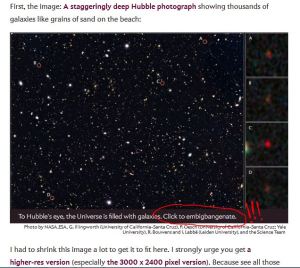Ever since my kids used the word “epic” to describe superlative events in their lives, I’ve paid attention to how people show emphasis. Now those same kids undercut their statements of wonder and awe with words like “sick” and “ill” to show backhanded emphasis (particularly effective in surfer/boarder/stoner monotone).
It’s challenging to stay on top of the linguistic zeitgeist, even when you’re plugged in all day.

language is as vast and quickly-evolving as our understanding of the solar system. Embigbangenate yours today!
I’m no linguist, just a writer and language hobbyist. When marketing I occasionally worry that dated phraseology unhelpfully underscores a long-gone era of reference: “fresh” is no longer fresh, you know, and if you’re not on top of the word or phrase of the day, it will show. “Edgy” is now dull, but do we have to delve into street slang to show we’re hip–er, what’s the current translation? And exactly how old is that intern screening incoming pitches?
Since I saw the word “embigbangenate” on a Facebook post about the solar system, I’ve been fascinated by how quickly our vocabulary changes and humbled by those who are on the cutting edge. It makes me wonder about novelists and the choices they make about everything that goes into a story, not just what technology to reference in their books (telephones? Computers? When will “bluetooth” be forgotten?) but the language choices that may put a decent story on the “uninformed” list. It’s not enough to write a good plot and description anymore is it?
(I wouldn’t suggest anyone use the word that caught my attention today, pinsploded, unless they want to forever be nailed to this moment in 2014 when Ohio housewives used a rainy day to update Pinterest with epic fervor.)
It must be the apex of cool to birth a whole new word and witness its journey around the world. I launched one yesterday, the word “bibliovore” that my family used to describe my daughters’ incredible appetites for reading. Scholastic “favorited” my Tweet about it; I guess now I can just sit back and wait for the royalties to roll in?
Sometimes I wonder what our grandparents said before there was an Internet to virally share new vocabulary. From what I remember in college that generation borrowed from foreign languages spoken by immigrants and music lyrics to pepper their daily speech. Pity the poor shlub whose parents couldn’t afford a phonograph.

